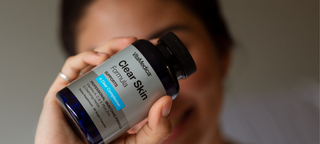If you’re like 85 million other Americans, chances are you’ll suffer from acne. Whether it’s the occasional breakout or a recurring problem that plagues your skin, dealing with acne can be frustrating and finding a solution can be even more so.
Acne is caused when hair follicles become clogged with sebum and dead skin cells, creating the perfect environment for bacteria to flourish.
While numerous treatments for acne are available, retinoids, derived from vitamin A, are among the most popular and effective. Retinoids help to unplug clogged pores and promote skin cell turnover to prevent further clogs.
Retinoid medications like Differin, Avage, Tazorac, Avita, Renova, and Retin-A are so important for acne management that they’re routinely prescribed by dermatologists for their acne patients.
Until now, these retinoid medications were available only by prescription. However, the FDA just approved Differin Gel 0.1% as an over-the-counter drug so this active ingredient is available without a prescription.
As keratolytics (removes a plug out of a hair follicle or sweat gland), retinoids can cause redness, peeling and overall skin irritability so you need to work with your doctor to find the right treatment that works for your skin.
Now, if you can use vitamin A topically to manage acne, doesn’t it make sense to get this nutrient through the foods you eat, too?
What is Vitamin A?
Vitamin A is a fat-soluble vitamin important for growth and development, vision, immune function, and reproduction. There are two forms – preformed vitamin A and provitamin A.
Preformed vitamin A, or retinyl palmitate, is found in meat, poultry, fish, and dairy, and the body converts it into one of three forms that it needs: retinol, retinal acid, and retinoic acid.
Provitamin A is produced by the body from compounds called carotenoids, found in fruits, vegetables, and other plant-based foods. Beta-carotene, the substance that gives many fruits and vegetables (like carrots) their yellow-orange color, is the carotenoid that most readily converts to vitamin A.
Some carotenoids like lycopene (found in tomatoes, pink grapefruit, watermelon), zeaxanthin and lutein (found in dark green and yellow vegetables) do not have any provitamin A activity. However, these carotenoids are still beneficial due to their antioxidant protective and other health benefits.
How Does Vitamin A Help Skin Health?
Vitamin A is necessary to maintain and repair epithelial tissue – what skin is made of. It helps stimulate skin growth at the base layer, help skin cells differentiate, and gives structural integrity (strength) to skin cells.
It also helps reduce sebum production and prevents keratin buildup in the follicle, both of which can lead to clogged pores. Deficiency in vitamin A is known to cause dry skin (making skin produce even more sebum to compensate), and it has been linked to outbreaks of severe acne.
The carotenoids your body uses to produce vitamin A are also potent antioxidants. They help fight free radicals – toxic molecules that cause oxidative stress in skin and make pores a more welcoming environment for acne-causing bacteria.
Good Sources of Vitamin A
To add more vitamin A-rich foods to your diet for clearer, healthier skin, here are your best options:
Animal Sources (retinyl palmitate): liver, kidney, egg yolks, butter, whole milk and cod liver oil. Non-fat milk products as well as some packaged foods (e.g., cereal) are fortified with vitamin A.
Plant Sources (carotenoids): apricots, melon, red peppers, carrots, cantaloupe, chives, parsley, shallots, sweet potato, broccoli, kale, dandelion greens, spinach, squash (winter or butternut), mustard greens, and pink grapefruit.
How Much Should You Get?
For adult women and men the Recommended Dietary Allowance (RDA) for vitamin A is 2,310 IUs and 3,000 IUs respectively. This recommendation applies only to vitamin A from retinyl palmitate. Because vitamin A is stored in tissue, getting too much (more than 10,000 IUs daily) over an extended period of time can cause vitamin A toxicity. Signs of vitamin A toxicity generally include dry skin, brittle nails, fatigue and nausea.
On the other hand, Vitamin A from carotenoids is produced as needed, and production decreases when your body has built up enough stores. There is no Institute of Medicine established RDA or upper limit for carotenoid sources of vitamin A, as no toxicity issues have been found. Five servings of fruits and vegetables per day will provide about 50-65% of the adult RDA for vitamin A.
Getting enough vitamin A from diet alone can be difficult, but you can always take a supplement to fill the gap. For supplements, the Reference Daily Intake (RDI) for vitamin A is 5,000 IUs, which represents 100% of the Daily Values recommended for both adult men and women. You’ll find that both types of vitamin A, retinyl palmitate and any carotenoids that can be converted to vitamin A must be listed under the vitamin A section of the supplement facts panel.
Take a Vitamin A Supplement
If you’re skin is breaking out, then it is a good idea to take a supplement that is designed to address healthy skin.
As Yvette La-Garde, VitaMedica’s director of education explains, “Our Healthy Skin Formula supplement is formulated with a combination of retinyl palmitate (5,000 IUs) and Betatene® - a natural, mixed carotenoid blend (7,500 IUs). Having the combination ensures that sufficient vitamin A is available to support healthy-looking skin. By providing 60 percent of the vitamin A in a carotenoid form, it ensures that the product is safe and that the total amount of vitamin A delivered is well below the upper tolerable limit.”
Women who are pregnant, planning to become pregnant or breast-feeding should ask a doctor about using retinoid medications or taking a vitamin A containing supplement. Some retinoid drugs have been shown to cause birth defects. Pregnant women should keep their supplemental vitamin A levels below 5,000 IUs or take a carotenoid supplement instead.
Eating clean and healthy will always have a positive impact on your skin health, and when spotty skin is stressing you out, just remember to get more “A” for acne!

